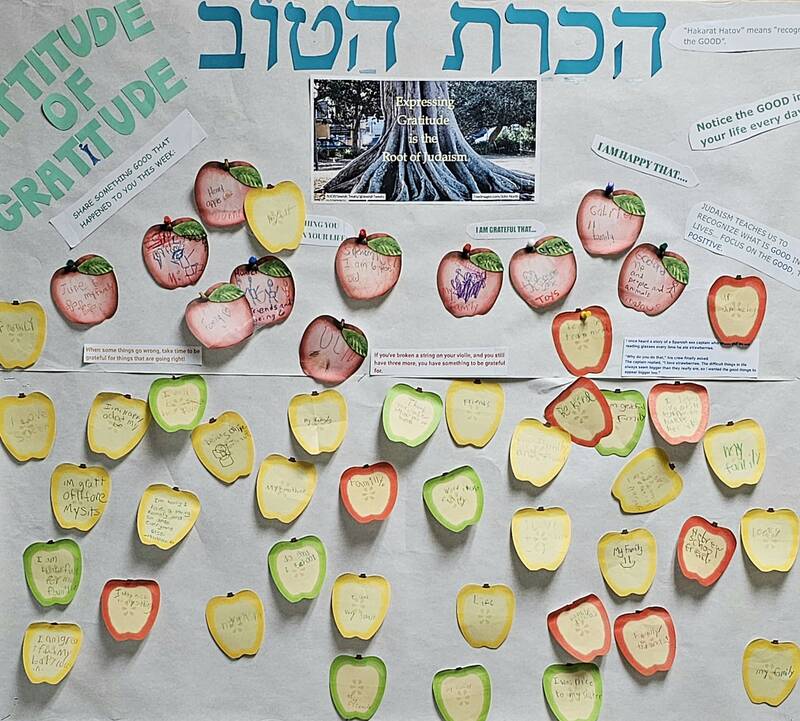Hakarat Hatov, Recognition of Good
09/11/2023 03:30:37 PM

When one has only one brief Religious School lesson in which to teach about the High Holidays, the holiest days on our calendar, what to we teach? That is the challenge with which we were faced this year with the challenge imposed by this year's Jewish calendar. I had a 30 minute period with the whole school and I pondered this question. We started by talking about the themes and traditions of Rosh Hashanah and then viewing my favorite Rosh Hashanah Youtube video. While we watched I paused to point out all the symbols and themes in the video from the flash of the Jewish year, the pomegranates, the singers referencing the prayer that we should all be like "heads rather than tails", the "book of life" and the wearing of white. It is all there in this video. Watch it for yourselves and see how many Rosh Hashanah themes you can find:
Dip Your Apple - The Fountainheads
Then we pivoted to talk about the value of "Hakarat Hatov", "Recognition of Good" in our lives. So much of starting a New Year is about gratitude and positivity for what we have. I paraphrased the following story for them, a story told by Alan Morinis
"There is a story—maybe an urban legend, but full of truth nonetheless—concerning the famous violinist Itzhak Perlman. One evening, Perlman was in New York to give a concert. As a child he had been stricken with polio and so getting on stage is no small feat for him. He wears braces on both legs and walks with two crutches. Perlman crosses the stage painfully slowly, until he reaches the chair in which he seats himself to play. As soon as he appeared on stage that night, the audience applauded and then waited respectfully as he made his way slowly across the stage to his chair. He took his seat, signaled to the conductor to begin, and began to play. No sooner had he finished the first few bars than one of the strings on his violin snapped with a report like gunshot. At that point, Perlman was close enough to the beginning of the piece that it would have been reasonable to have brought the concert to a halt while he replaced the string, to begin again. But that’s not what he did. He waited a moment and then signaled the conductor to pick up just where they had left off. Perlman now had only three strings with which to play his soloist part. He was able to find some of the missing notes on adjoining strings, but where that wasn’t possible, he had to rearrange the music on the spot in his head so that it all still held together. He played with passion and artistry, spontaneously rearranging the symphony right through to the end. When he finally rested his bow, the audience sat for a moment in stunned silence. And then they rose to their feet and cheered wildly. They knew they had been witness to an extraordinary display of human skill and ingenuity. Perlman raised his bow to signal for quiet. “You know,” he said, “sometimes it is the artist’s task to find out how much beautiful music you can still make with what you have left.” We have to wonder, was he speaking of his violin strings or his crippled body? And is it true only for artists? We are all lacking something and so we are challenged to answer the question: Do we have the attitude of making something of beauty out of what we do have, incomplete as it may be? The Hebrew term for gratitude is hakarat hatov, which means, literally, “recognizing the good.” Practicing gratitude means recognizing the good that is already yours."
May this year be one of increased gratitude for all, the kind of gratitude that helps us overcome the deficits and disappointments in our lives.
